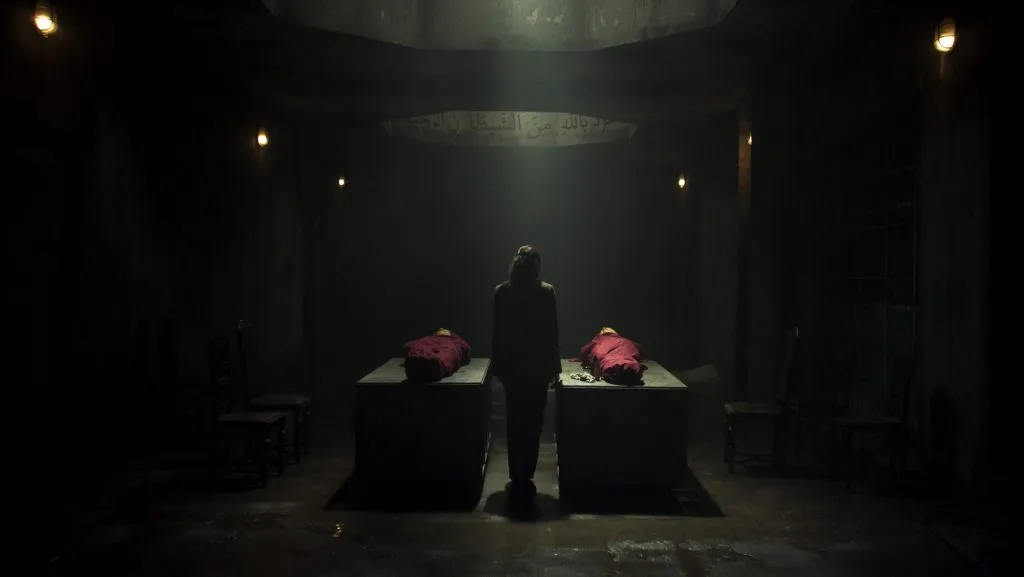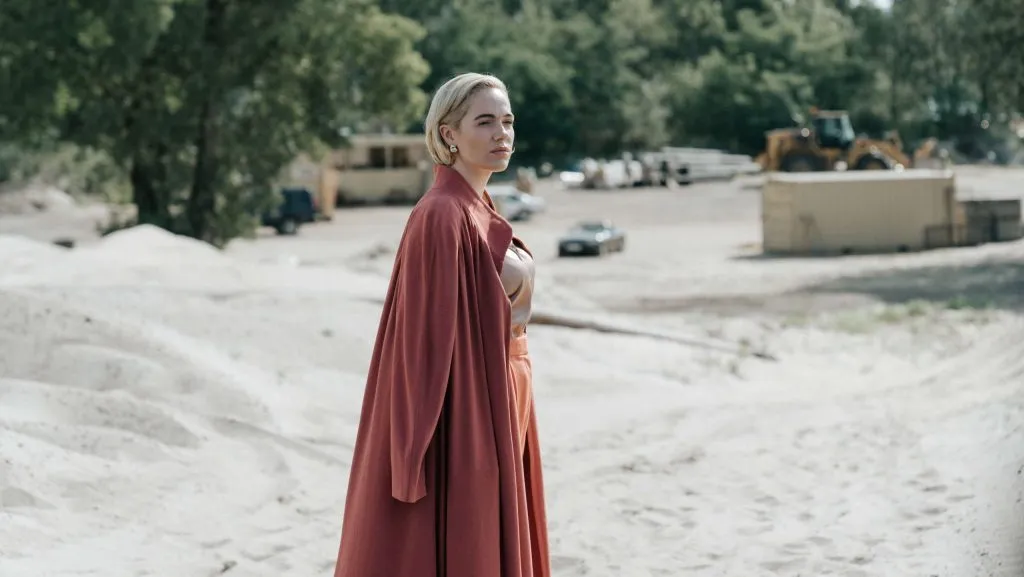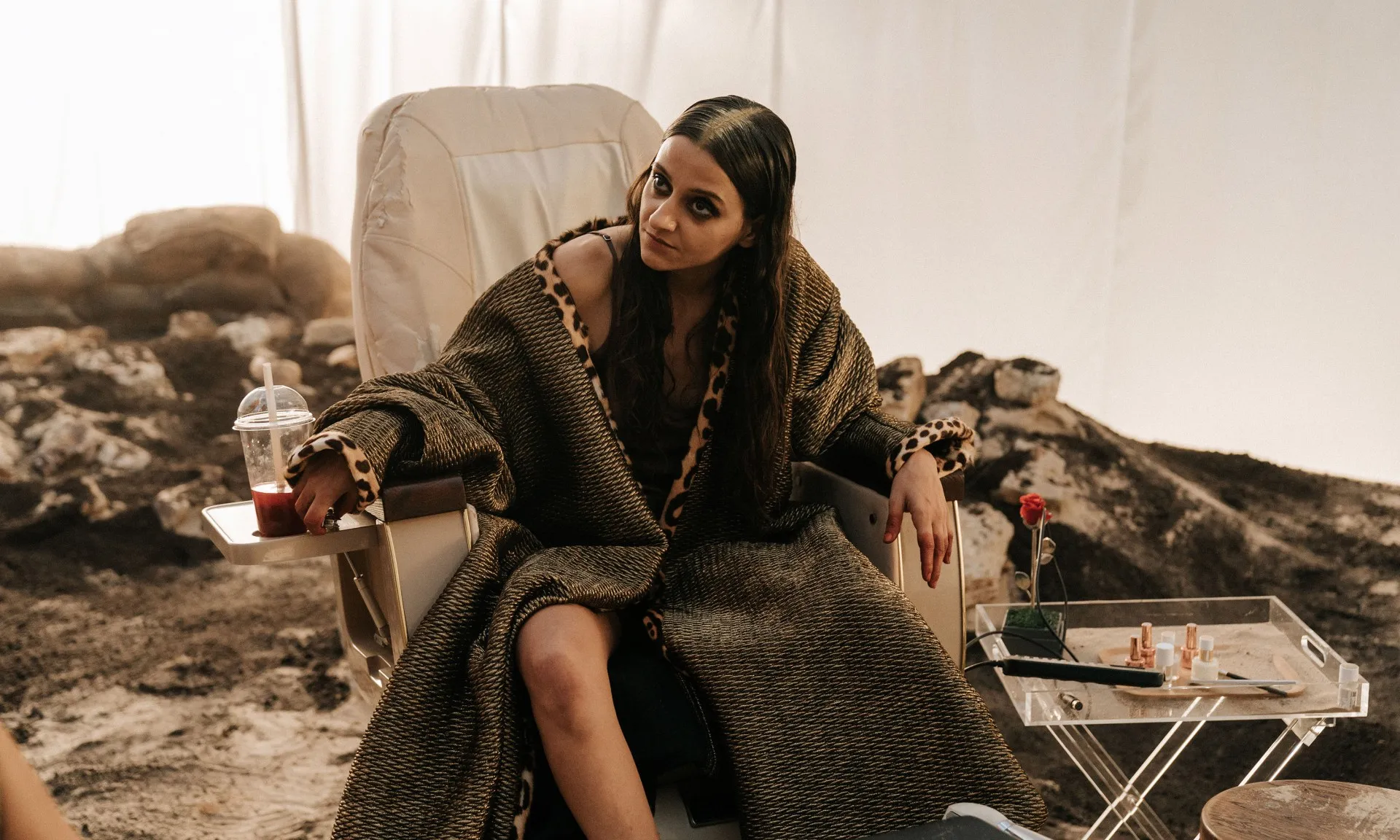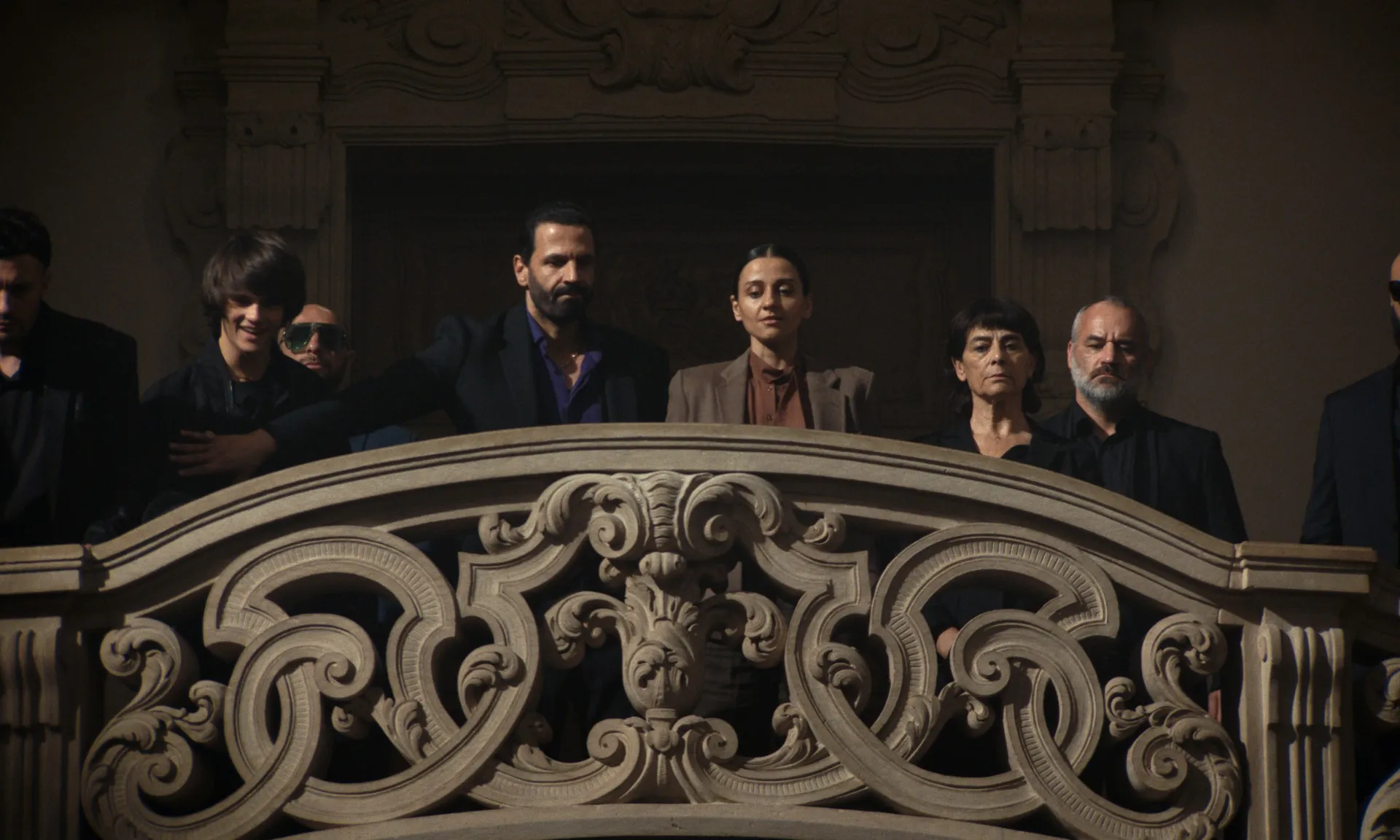In Kein Tier. So Wild., Burhan Qurbani tears down the dusty corridors of history to erect a brutal underworld palace in modern Berlin. Here, the shivering poetry of Richard III is recast in the voice of Rashida York—the lone woman among hardened patriarchs—who claws her way toward a throne built on blood debts and broken oaths.
The film pulses like a heart encased in steel: high‑velocity crime sequences collide with operatic tableaux, while shards of Shakespearean verse puncture the everyday grit of Kanak slang. Neon‑lit backrooms flicker against the arid stillness of a desert prologue, reminding us that every ambition carries its own wasteland.
Rashida’s rise is more than a power grab; it is a meditation on the loneliness of absolute will, on what happens when the human soul becomes collateral damage in its own war machine. Cinematographer Yoshi Heimrath bathes those collisions in harsh light and deep shadow, and Dascha Dauenhauer’s score throbs like a heartbeat edging toward rupture. At the center stands Kenda Hmeidan, whose gaze lingers on the camera as if beckoning us to witness the hollow exaltation of supremacy.
Blueprint of Betrayal: From Renaissance to Neukölln
Beneath its neon sheen, Kein Tier. So Wild. carries the rib‑cage of Richard III—a relentless quest for power, the cold calculus of fratricide, and the poison‑tongued betrayals that topple kings. Qurbani harvests these primal impulses and transplants them into Berlin’s migrant underworld, where old bloodlines trade royal pedigree for clan loyalty. The resonant echo of a hunchbacked tyrant is reborn as Rashida York, her spine unbroken but her spirit warped by the same thirst for dominion.
The film opens in a scorched Middle Eastern landscape, a slow‑motion elegy for childhood trauma. That prologue functions as origin myth: a single shot of dust swirling around shattered bones suggests the cruelty that will pursue Rashida across continents. Chapter titles—“The Beginning Before the Beginning,” “Flesh and Blood,” “Sand and Dirt”—flash on screen like carved runes, guiding our breaths and pauses. They impose a ritual cadence, yet sometimes that rigid structure feels at odds with the wild volatility of the narrative itself.
Rashida’s trajectory arcs from a bombastic courtroom speech to a clandestine family coup and finally into a cavernous desert mausoleum, where her rivals yield to sand and silence. Along the way, allegiances fracture: Imad’s weary pragmatism crumbles, Ghazi’s flaws invite ruin, and the mansion of the Lancasters becomes a theater of corpses. Even the Princes, seeking sanctuary, find no refuge from her designs.
Qurbani’s original flourishes—most strikingly a lurid seduction in a mortuary—tremble between inspired audacity and stylistic excess. The middle acts pulse with urgency, yet the final third retreats into stark minimalism, trading kinetic energy for austere tableaux. At moments, one wonders if the film’s own need to astonish undermines the clarity of its tragic blueprint. Silence seeps in, and with it, the question: what remains when ambition strips away every façade?
Emissaries of Ambition: Flesh, Gaze, Betrayal
Rashida York (Kenda Hmeidan) moves through each frame like a sculpted shadow, her body a battleground where intellect and instinct collide. Every tilt of the head carries the weight of Nietzsche’s will to power, and when she breaks the fourth wall, her eyes become accusation and invitation in equal measure.
Those direct‑to‑camera monologues feel less like speeches than ritual summons—an unspoken contract in which we consent to witness her ascent and our own complicity. Watching her shed the veneer of a barrister for the mantle of sovereign, we glimpse the price of sovereignty: an irreversible solitude that even her fiercest smiles cannot mask.
Imad and Ghazi York (Mehdi Nebbou, Camill Jammal) inhabit two sides of a fractured mirror. Imad’s leadership is stained with exhaustion—he bears the world’s cruelties like a tired crown—while Ghazi drifts between loyalty and self‑loathing, a tragic testament to how vulnerability can become a death sentence in a realm where trust is currency. Their bond, once unbreakable, splinters under Rashida’s ruthless logic, reminding us that family can be both refuge and crucible.
Mishal (Hiam Abbass) carries the memory of maternal warmth in one gloved hand and a silenced pistol in the other. Her transformation from gentle guardian to deadly instrument evokes Kierkegaard’s notion of the tragic hero: bound by love yet condemned by duty. Her loyalty trembles on the edge of conscience, a moral fulcrum upon which Rashida’s ambitions pivot.
Elisabet (Verena Altenberger) stands apart, a foreigner who wields influence like a blade hidden in velvet. As outsider‑turned‑power player, she embodies Hegel’s master‑slave dialectic: her marriage grants status even as it traps her in the York orbit. Her calm precision is the counterpoint to Rashida’s fevered drive, and in their confrontations we feel the tension between assimilation and resistance.
Ghanima Lancaster (Mona Zareh Hoshyari Khah) dances between seduction and vengeance, her allure a mirror of Rashida’s own dark charm. Their encounters unfold like whispered bargains in a morgue, where the scent of death mingles with desire, and betrayal becomes the ultimate erotic currency.
Together, these performances coalesce into a fractured chorus, a mosaic of diaspora and desire, where each actor’s intensity deepens the film’s meditation on identity, loyalty, and the shadows we must embrace to claim power.
Theatre of Shadows: Constructed Realities
Qurbani’s Berlin feels less like a city and more like a staged crucible. Bars, brothels, even the mosque under construction stand on bespoke soundstages, as if each wall were a page in an allegory. High‑rises vanish; instead we move through interior non‑places—sterile corridors, cavernous warehouses—that refuse the specificity of real geography. It’s a deliberate estrangement, a cinematic echo of Marc Augé’s “non‑places,” where identity drifts and power asserts itself through space rather than street signs.
Lighting carves that emptiness into moans of color. Neon veins pulse through underground lairs, bathing characters in electric alienation. In the desert prologue, muted browns and ochres suffuse the air, binding memory to dust. Later, mist‑shrouded “hellscapes” emerge in tomb‑like sets, where chiaroscuro becomes a proposition: is truth revealed in shadow, or buried beneath it?
Costumes and makeup adhere to a militant uniformity. Rashida’s leather biker‑girl armor is less fashion than battle standard—no prosthetics to betray weakness, only sleek defiance. Her lieutenants mirror her in dark helixes of braided hair; collective identity forged in steel and skin.
Yoshi Heimrath’s lens moves like a stalking conscience. Tight courtroom frames constrict, each angle suggesting an invisible noose. In open tombs, the camera retreats only to plunge forward in slow motion, as if probing the weight of each heartbeat. Abrupt cuts snap the world into jagged fragments, echoing Sartre’s notion that freedom is born of rupture.
Iconic moments arrive unannounced: helmets removed in synchronized hair‑shake, a ritualistic shedding of armor; the morgue seduction, flesh illuminated against cold marble; the final desert tableau, bodies half‑buried in sand as though history feeds on its dead. These sequences pulse with a raw confidence, reminders that cinema can sculpt reality even as it deconstructs it.
Echoes of Fury: Sound as Reckoning
Dascha Dauenhauer’s score crackles with a “chaotic buzz,” as though every instrument vies for dominance in Rashida’s psyche. Pulsing drums and electronic throb propel us forward, yet at moments swell into Mephistophelean grandeur—a sonic embodiment of ambition’s dark pact.
The sound design deepens this dialectic. Courtroom gavel strikes reverberate like distant thunder, as if each verdict fractures the world. In contrast, the desert’s hush becomes an oppressive silence, pressing against the eardrums until memory itself seems to erode.
Philipp Thomas’s editing stitches these sonic extremes into a tapestry of tension. For two and a half hours, cuts land with precision—heartbeats given space, then snapped back into chaos. Yet in the film’s final third, momentum loosens: extended takes linger in abstract repose, and the pulse we’ve followed until then falters under its own weight.
Throughout, language becomes part of the score: Shakespeare’s verses echo like ancient prophecies, while Kanak slang grounds us in street‑level immediacy. The collision of poetic cadences and rough‑hewn speech creates an auditory battleground where power is won with words as much as weapons.
Veils of Dominion: Bloodlines and Babel
Rashida York overturns patriarchal scripts with a feral grace. She channels Nietzsche’s will to power in limbs that strike like hammers, her ambition unrestrained by traditional gender codes. She blurs the line between the subject and the object of power, forcing us to ask: can sovereignty exist free of solitude, or does the throne demand a self both exalted and exiled?
Berlin’s migrant underworld is painted as both refuge and cage. The mantra “Foreign blood oils German unity” echoes like a cursed refrain, a constant reminder of alterity. Each character seems cast by trauma—war‑scarred prologues haunt their steps. In this diaspora, identity is a warzone of belonging and estrangement, where roots feed both strength and suspicion.
Qurbani wields stereotype as both scalpel and blunt instrument. At times his allegory cuts deep, exposing right‑wing fantasies in a brutal mirror. Yet he piles on references—echoes of Berlin Alexanderplatz, desert myths, modern Islamophobia—that threaten to collapse under their own weight. The film flirts with caricature until it teeters on absurdity, leaving us uncertain whether we witness critique or carnival.
From the blood‑licked desert to the neon tombs, a sense of inexorable destiny propels each betrayal. Rashida’s path resembles Oedipal inevitability: a prologue of violence sets the die, and every step redoubles the tragic pattern. Acton’s dictum shimmers beneath—power corrupts, yet corruption beckons with electric allure. We sense fate not as cosmic justice but as a mirror of our own darkest drives.
Words in Kein Tier become blades. Shakespearean hexameters clash with Kanak slang in a linguistic trench war, echoing Derrida’s différance: meaning deferred, contested. Rashida’s soliloquies ripple with classical echoes, then snap to street rhythms, reminding us that language shapes reality as ruthlessly as any bullet. In that tension, culture itself stands accused and defended in equal measure.
Throne of Blood: After the Fall
Kenda Hmeidan’s magnetic intensity and Qurbani’s fearless visual inventiveness stand as the film’s greatest triumphs, even as its labyrinthine plot falters and the final act drifts into austere abstraction. Within Burhan Qurbani’s body of work, this modern Richard III marks both a bold continuation of his urban mythmaking and a reminder that ambition can outpace narrative clarity.
Those drawn to audacious crime dramas infused with poetic violence will find themselves enthralled, while viewers craving structural cohesion may feel unmoored. Rashida York’s ascent poses a question that lingers like smoke in the aftermath of destruction: when a woman claims a throne built by men, does she inherit their legacy—or ignite an entirely new reckoning?
Full Credits
Director: Burhan Qurbani
Writers: Burhan Qurbani, Enis Maci
Producers: Leif Alexis, Sophie Cocci, Jochen Laube, Fabian Maubach, Klaudia Śmieja-Rostworowska, Beata Rzeźniczek
Cast: Kenda Hmeidan (Rashida York), Mehdi Nebbou (Imad York), Verena Altenberger (Elisabet York), Hiam Abbass (Mishal), Mona Zarreh Hoshyari Khah (Ghanima Lancaster), Meriam Abbas (Qamar York), Camill Jammal (Ghazi York), Deniz Arora (Ismail Ibn Ibrahim), Banafshe Hourmazdi (Khalifa), Özay Fecht (Wicked Sister 1), Çiğdem Teke (Wicked Sister 2), Hayal Kaya (Wicked Sister 3)
Director of Photography (Cinematographer): Yoshi Heimrath
Editor: Philipp Thomas
Composer: Dascha Dauenhauer
The Review
Kein Tier. So Wild.
A tempest of ambition and elegiac beauty, Kein Tier. So Wild. dazzles with Kenda Hmeidan’s electrifying presence and Burhan Qurbani’s audacious imagery, even as its narrative labyrinth loses shape in the final act. It asks: can power born of violence ever find redemption, or is every throne destined to crumble under its own weight?
PROS
- Kenda Hmeidan’s riveting, body‑language‑driven performance
- Bold, theatrical production design and striking lighting contrasts
- Innovative blend of Shakespearean verse with contemporary slang
- Haunting, pulse‑driven score by Dascha Dauenhauer
- Philosophical undercurrents on power, identity, and exile
CONS
- Narrative coherence suffers in an overlong runtime
- Third act’s minimalist shift undercuts earlier momentum
- Occasional overreliance on stereotypes and allegorical clichés
- Sparse use of real Berlin landmarks weakens sense of place





















































